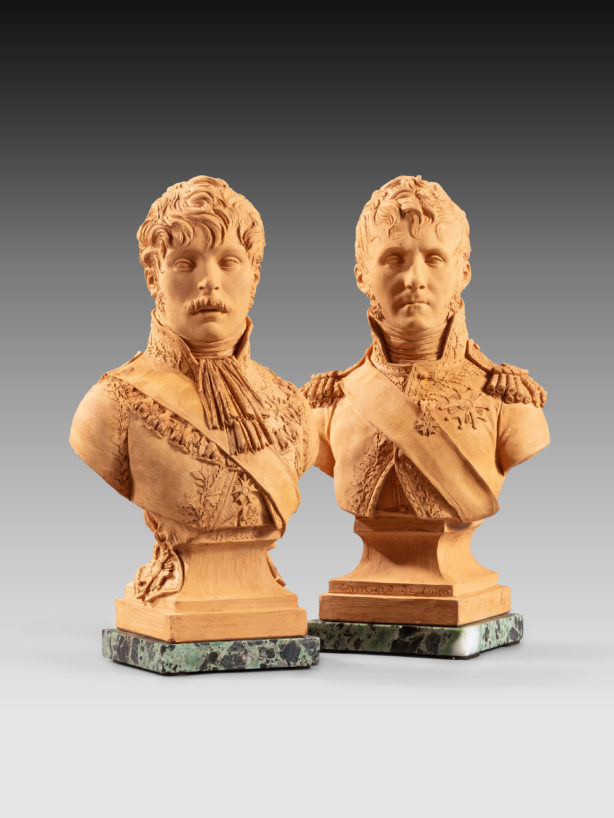Busts of Eugène de Beauharnais and Felice Baciocci by Joseph Chinard (1756-1813)
In 1805, Eugène de Beauharnais obtained the dignities of Archchancellor of State and Grand Eagle of the Legion of Honor; he was still only 24 years old. On June 7, 1805, Eugene was entrusted, as viceroy, with the administration of the kingdom of Italy where he spent almost half of his time. After the Italian campaign of 1805, he married Princess Augusta-Amélie, daughter of King Maximilian I of Bavaria, an ally of France, in Munich on 14 January 1806. Napoleon invested him with the title of Prince of Venice, declared him his adopted son and the heir apparent to the crown of Italy. Eugene remained viceroy of Italy from 1805 to 1814.
***
Felice Pasquale Bacciocchi, coming from one of the oldest and most noble Corsican families, was at the beginning a military man without particular genius but who came however to overcome a magnificent conquest: that of Elisa Bonaparte (1777-1820). His career took a more brilliant turn, although it did not reach the heights reached by Joachim Murat, another brother-in-law of Napoleon Bonaparte. General Bonaparte “adopted” his brother-in-law and made him, without having to draw the sword, colonel of the 26th regiment of light infantry. He then became a member of the Legion of Honor on the 19th of Frimaire, Year XII, then an officer of the same order on the following 25th of Prairial.
In 1805, Napoleon wanted to give a crown to his sister Elisa: he offered her the sovereign principality of Piombino with the decree of 27 ventôse year XIII (18 March 1805). Shortly afterwards, on 15 Prairial XIII (4 June 1805), the “Council of Dukes” (Senate) of the small republic of Lucca asked Napoleon, in his capacity as King of Italy, to entrust the government of the Republic to a member of his family and to make it hereditary in the natural descendants of the latter. Consequently, Napoleon chose Elisa’s husband, Felix Baciocchi, and the choice was ratified by Lucca on the 25th of Prairial (June 14). Baciocchi was named prince of Lucca by the constitution of 4 messidor (23 June). The coronation of prince Baciocchi and his wife took place on 12 messidor (July 1, 1805).
Recognizing the high superiority of his wife, Baciocchi left her the whole direction of the affairs and was satisfied with a role which oscillated between those of aide-de-camp and prince consort. Complaisant husband, he supports with serenity the infidelities of his wife and is satisfied to see her governing the states which she holds from the Emperor. In 1809, a senatus-consult of March 2 having erected in great dignity of the Empire the departments of the ex-kingdom of Etruria, the Emperor named the princess of Piombino and Lucca grand duchess of Tuscany. The prince was made general of division and commander of the 29th military division in Florence. Benevolent, human, gentle, liberal, just, loving and protecting the arts and the most commendable people of letters, Felix Baciocchi leaves, in Tuscany and everywhere he was known, an honored memory.




